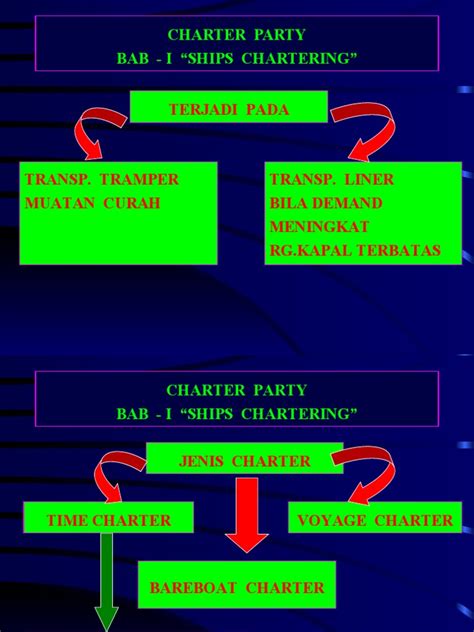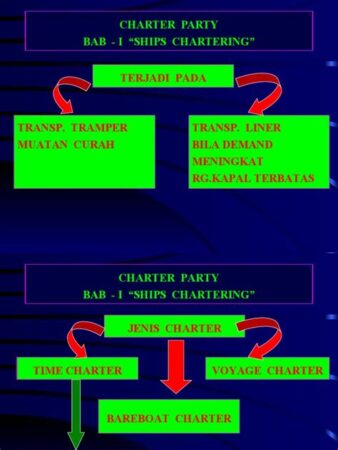
- Charter Party in Maritime Law: A Comprehensive Guide for Readers
- Introduction:
- Types of Charter Parties
- Key Provisions of a Charter Party
- Legal Implications of Charter Parties
- Practical Applications of Charter Parties
- Table of Key Concepts Related to Charter Parties in Maritime Law
- Conclusion
-
FAQ about Charter Party
- What is a charter party?
- What are the different types of charter parties?
- What are the essential elements of a charter party?
- What are the obligations of the ship owner under a charter party?
- What are the obligations of the charterer under a charter party?
- What are the consequences of breach of a charter party?
- How is a charter party terminated?
- What is the role of a charterer’s agent?
- What is the role of a ship broker?
- What is the difference between a charter party and a bill of lading?
Charter Party in Maritime Law: A Comprehensive Guide for Readers

Introduction:
Greetings, readers! Welcome to our in-depth exploration of charter parties in maritime law. A charter party is a fundamental contract in the shipping industry, defining the rights and obligations between ship-owners and charterers, the parties who hire ships to transport goods or passengers. Understanding this crucial document is essential for navigating the complexities of maritime law.
In this article, we’ll delve into the intricacies of charter parties, examining their different types, key provisions, legal implications, and practical applications. So, buckle up, fellow seafarers, and let’s embark on this voyage into the world of charter parties!
Types of Charter Parties
Time Charter Party
In a time charter party, the charterer rents a ship for a specific period (e.g., six months, one year), paying a fixed rate regardless of the amount of cargo carried or the distance traveled. The shipowner retains possession and control of the vessel, while the charterer specifies the ship’s employment within agreed-upon parameters.
Voyage Charter Party
A voyage charter party is a one-off arrangement for a single voyage. The charterer pays a freight rate based on the cargo quantity and the distance to be covered. The shipowner retains control of the ship, but the charterer has specific rights regarding the cargo’s loading, discharge, and handling.
Bareboat Charter Party
In a bareboat charter party, the charterer takes complete possession and control of the ship, as if it were their own. They are responsible for the ship’s operation, maintenance, and crewing. The shipowner’s involvement is minimal, and they receive a fixed periodic payment from the charterer.
Key Provisions of a Charter Party
Responsibilities of the Shipowner
- Maintaining the ship’s seaworthiness
- Providing a competent crew
- Loading and discharging cargo efficiently
- Complying with all applicable regulations
Responsibilities of the Charterer
- Paying the agreed freight rate
- Loading and discharging cargo in accordance with the charter party’s terms
- Respecting the shipowner’s possession and control of the ship
Legal Implications of Charter Parties
Breach of Contract
Failure to fulfill the obligations outlined in the charter party can result in legal action. The injured party can seek damages, specific performance, or termination of the contract.
Maritime Liens
A maritime lien is a legal claim against a ship arising from unpaid debts or other obligations. Charter parties can create maritime liens if the charterer fails to pay the freight rate or other expenses.
Arbitration and Resolution of Disputes
Charter parties often contain arbitration clauses, providing for the resolution of disputes outside the court system. This process is often preferred due to its speed, confidentiality, and specialization in maritime matters.
Practical Applications of Charter Parties
Charter parties are used in a wide range of maritime activities, including:
- Transporting raw materials (e.g., oil, iron ore)
- Shipping manufactured goods (e.g., cars, electronics)
- Providing passenger services (e.g., cruises, ferries)
- Offshore activities (e.g., drilling, exploration)
Table of Key Concepts Related to Charter Parties in Maritime Law
| Concept | Definition |
|---|---|
| Charterer | The party who hires a ship to transport goods or passengers |
| Shipowner | The owner of the ship who provides it to the charterer |
| Freight rate | The payment made by the charterer to the shipowner for the use of the ship |
| Laytime | The agreed period during which the ship is allowed to load or discharge cargo |
| Demurrage | A penalty paid by the charterer if the ship is detained beyond the agreed laytime |
| Sub-charter | A charter party where the charterer hires out the ship to a third party |
Conclusion
Readers, we hope this comprehensive guide has shed light on the multifaceted nature of charter parties in maritime law. Whether you’re a shipowner, a charterer, or an aspiring professional in the shipping industry, understanding charter parties is crucial for navigating the legal and practical aspects of this complex field. We encourage you to explore the other articles on our website for further insights into maritime law and related topics.
Thank you for being our fellow travelers on this maritime adventure!
FAQ about Charter Party
What is a charter party?
Answer: A charter party is a contract between a ship owner and a charterer for the use of a vessel. It sets out the terms and conditions of the agreement, including the duration of the charter, the purpose of the charter, the rate of hire, and the responsibilities of the parties.
What are the different types of charter parties?
Answer: There are three main types of charter parties: voyage charter parties, time charter parties, and bareboat charter parties. Voyage charter parties cover a single voyage, time charter parties cover a specific period of time, and bareboat charter parties give the charterer full control and possession of the vessel.
What are the essential elements of a charter party?
Answer: The essential elements of a charter party are the names and addresses of the parties, the description of the vessel, the duration of the charter, the purpose of the charter, the rate of hire, and the responsibilities of the parties.
What are the obligations of the ship owner under a charter party?
Answer: The ship owner’s obligations under a charter party typically include providing a seaworthy vessel, maintaining the vessel in good condition, and operating the vessel in a safe and efficient manner.
What are the obligations of the charterer under a charter party?
Answer: The charterer’s obligations under a charter party typically include paying the hire, loading and unloading the vessel, and providing cargo that is suitable for the vessel.
What are the consequences of breach of a charter party?
Answer: The consequences of breach of a charter party can include damages, termination of the charter, and loss of the vessel.
How is a charter party terminated?
Answer: A charter party can be terminated by mutual agreement of the parties, by the occurrence of a breach of contract, or by the operation of law.
What is the role of a charterer’s agent?
Answer: A charterer’s agent is responsible for representing the charterer in negotiations with the ship owner and for arranging the details of the charter party.
What is the role of a ship broker?
Answer: A ship broker is responsible for bringing together the ship owner and the charterer and for negotiating the terms of the charter party.
What is the difference between a charter party and a bill of lading?
Answer: A charter party is a contract between a ship owner and a charterer for the use of a vessel, while a bill of lading is a document that evidences the receipt of goods for shipment.




